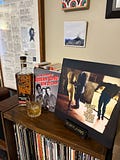Dylan's Rough and Rowdy Ways
"Mother of Muses, unleash your wrath. Things I can't see, they're blocking my path."
After writing my post on Springsteen’s 1992 performance and talking about “the other band,” I kept returning to that question of what you do when an artist does something exceptionally well and yet turns away from it.
I realized that there was an example of this from musical history I had not remembered. It was someone who famously turned away from what made him a major musical figure and was, in turn, met with great vitriol. I am thinking about the Nobel Prize Winner himself, Bob Dylan.
Yet the irony of all this is that Dylan’s decision to move away from what he was best known for towards something radically different (which was greeted with not just confusion but outright hatred) is when Dylan moves into my (and probably most people’s) favorite era of his work.
I mean, I’ll listen to a recording of just the drum and organ track from ”Like a Rolling Stone” because that’s just how much I love that sound.
Between this thought crossing through my mind, my recent plunging into the Jokermen podcast, and the release of the book he wrote (The Philosophy of Modern Song, which I’ll probably be writing about sometime soon) Dylan has been on my mind a bit of late. With that said, I thought I’d to a (bit belated) assessment of the latest Dylan album, Rough and Rowdy Ways.
While Dylan’s last three albums have been performances of songs from the great American songbook, Rough and Rowdy Ways was filled with compositions by Dylan. This was the first album of originals since 2012’s Tempest, which made it an even more notable release.
So I decided to get the record, put it on my turntable, pour myself a glass of Heaven’s Door whiskey, and give it a listen.
Overall, I did find it to be a more interesting and rewarding listening than some of these more recent Dylan recordings. While I did enjoy Dylan’s foray into the realm of Sinatra on those prior albums, there’s something more interesting and enjoyable about hearing this master compose and perform. I mean, he didn’t win the Nobel Prize in Literature because he’s a great performer. He’s one of the great writers in the history of the world. Thus, hearing what he’s written is going to be much more interesting.
Tracks like “False Prophet” and “Goodbye Jimmy Reed” have a great bluesy stomp to them as they feel like the kinds of songs that would sound great playing on a jukebox even though they feature lyrics befitting of an English classroom’s analysis. Speaking of English classrooms, the album’s opening track “I Contain Multitudes” makes an obvious connection to Walt Whitman. But though the idea of containing multitudes comes to us from Whitman’s “Song of Myself,” it makes just as much sense to be about Dylan.
I'm a man of contradictions, I'm a man of many moods.
I contain multitudes
With its Whitman allusion and lilting guitar melody, “I Contain Multitudes” is probably my favorite track on the album. It almost sounds like Love & Theft-era Dylan, which I certainly appreciate. The same thing goes for “Key West (Philosopher Pirate)” in terms of my appreciation for its literary aspirations and allusions as well as the great use of the accordion.
I was born on the wrong side of the railroad track
Like Ginsberg, Corso and Kerouac
It’s a track that feels a little like a cross between Oh Mercy and Time Out of Mind (both of those Daniel Lanois-produced albums).
But the song that is the most discussed from the album is the final track, “Murder Most Foul.” The song is an investigation and meditation upon the assassination of John F. Kennedy and its effect upon our country and culture. “Murder Most Foul” even reached #1 on the Billboard US Rock Digital Song Sales chart (the first time a Dylan song has reached number one on any chart).
At 16 minutes, it took up one whole side of the LP, and thus it reminds me a bit of “Brownsville Girl” from Knocked Out Loaded in its length and phrasing. “Murder Most Foul,” befitting both the subject matter and Dylan’s more advanced age, is a little more subdued and restrained than “Brownsville Girl.” The musical accompaniment, featuring piano and strings, as well as the ambient quality to the production calls to mind Oh Mercy, specifically “Disease of Conceit.”
It’s a fascinating track for Dylan to put out, one in which he goes back to the 60s and thinks about that pivotal moment of JFK’s assassination, that same time that saw him ascend as one of our country’s major voices and artists. But when one remembers what was going on around the composition and production of this album—the Trump administration, the peak of the COVID pandemic—it might make sense to return to the time when there seemed to be real hope and potential that was taken away because of this “murder most foul.”
I’m glad for every one of Dylan’s releases—the fact that he’s still producing music (whether they’re re-imaginings of songs from America’s past or his own originals) is a wonderful thing and we should appreciate that. But even beyond that, Rough and Rowdy Ways is a great addition to the Dylan oeuvre. I’d venture to say it’s the most vital album since Love & Theft. For an artist in his 80s, to produce another album that belongs in the pantheon of all his other great albums, that’s something profoundly special.




